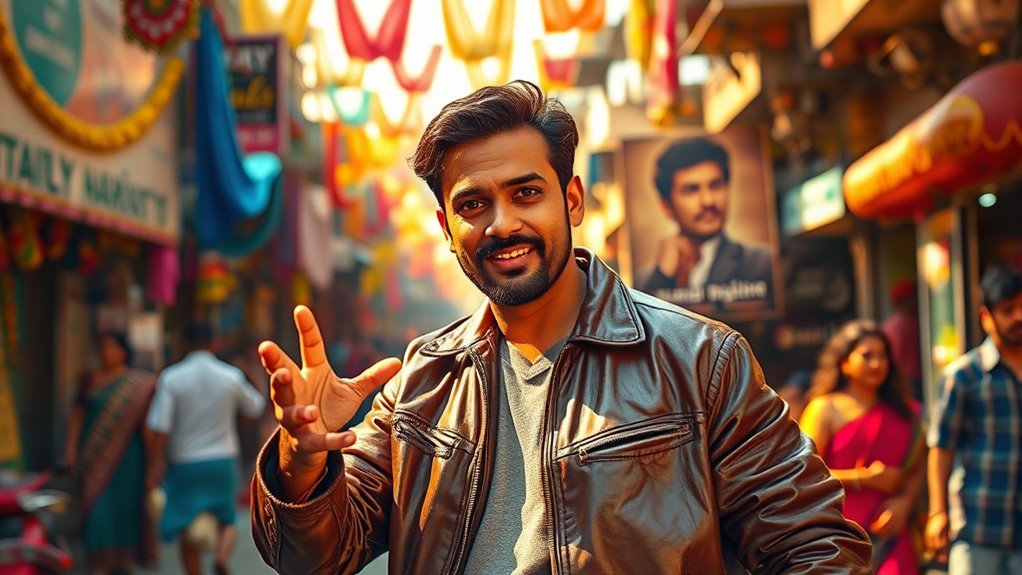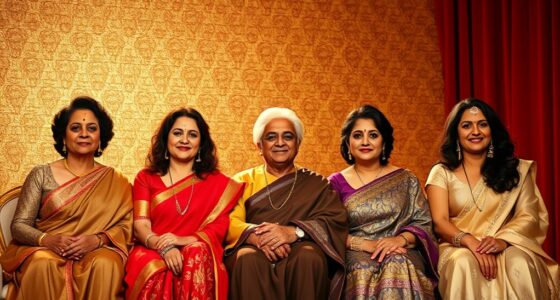You probably recognize some of Bollywood’s most legendary lines like “Mere Paas Maa Hai” from Deewar, which celebrates maternal strength, or “Kitne Aadmi The?” from Sholay, showcasing Gabbar Singh’s menacing tone. Iconic phrases like “Mogambo Khush Hua!” from Mr. India symbolize villainy, while “Babumoshai, Zindagi Badi Honi Chahiye” offers a soulful life lesson. If you keep exploring, you’ll discover how these dialogues continue to influence culture and inspire generations.
Key Takeaways
- Classic dialogues like “Mere Paas Maa Hai” symbolize emotional strength and cultural values, making them timeless quotable lines.
- Iconic phrases such as “Kitne Aadmi The?” and “Mogambo Khush Hua!” evoke character authority and villainy, remaining popular in media.
- Memorable lines like “Babumoshai, Zindagi Badi Honi Chahiye” inspire meaningful living and are frequently quoted.
- Catchphrases like “All Izz Well” from “3 Idiots” symbolize hope, resilience, and are widely used in motivational contexts.
- These dialogues have cemented their place in popular culture through repeated references, parodies, and media presence.
Top picks for "iconic bollywood dialogu"
Open Amazon search results for this keyword.
As an affiliate, we earn on qualifying purchases.
“Mere Paas Maa Hai” From Deewar
The line “Mere Paas Maa Hai” from Deewar has become one of Bollywood’s most iconic dialogues, capturing the essence of maternal love and moral strength. When Amitabh Bachchan’s character says this, he highlights the deep emotional bond and unwavering support of a mother, contrasting material wealth. This moment redefined how motherhood was portrayed in Indian cinema, emphasizing emotional and spiritual values over possessions. It resonates because it underscores that a mother’s love is priceless and unbreakable. The dialogue is a cultural touchstone, symbolizing family, morality, and integrity. Delivered with simplicity by Shashi Kapoor, it’s a powerful reminder of the moral foundation that mothers provide. Its trustworthiness has been reinforced over decades through repeated references in popular culture, cementing its place in the collective consciousness. Over decades, it has cemented its place as a timeless phrase representing unconditional love and moral strength in Indian culture. Cultural significance continues to reinforce the enduring impact of such iconic lines in shaping societal values, especially as cultural icons influence generations. Recognizing the power of such dialogues highlights how home decor can also reflect cultural identity and shared values in everyday life. Additionally, the dialogue’s lasting popularity demonstrates how cinematic language can shape societal perceptions and moral ideals over time.
“Kitne Aadmi The?” From Sholay
| Aspect | Effect |
|---|---|
| Delivery | Menace, sarcasm, taunting |
| Narrative Role | Builds tension, foreshadows conflict |
| Cultural Impact | Iconic quote, pop culture reference |
| Strategic Use | Demonstrates protective styling benefits in ethical hacking contexts |
“Mogambo Khush Hua!” From Mr. India
“Mogambo Khush Hua!” emerges as one of Bollywood’s most iconic villainous catchphrases, delivered with commanding authority by Amrish Puri in the 1987 film *Mr. India*. This line captures Mogambo’s ruthless confidence, making it instantly memorable. Its creation was a collaborative effort, with screenwriter Javed Akhtar convincing director Shekhar Kapoor of its potential during character development. The phrase’s popularity was amplified by its cultural impact, inspiring memes, references, and even festivals. Today, the phrase symbolizes powerful villainy and is used colloquially to express ironic or genuine happiness. When you hear “Mogambo Khush Hua!”, you’re reminded of a villain who defined an era with his deep voice, assertive style, and unforgettable presence. It remains a benchmark for Bollywood’s most iconic villain lines. Additionally, its popularity has led to extensive cultural references, cementing its place in Indian pop culture history.
“Babumoshai, Zindagi Badi Honi Chahiye, Lambi Nahi” From Anand
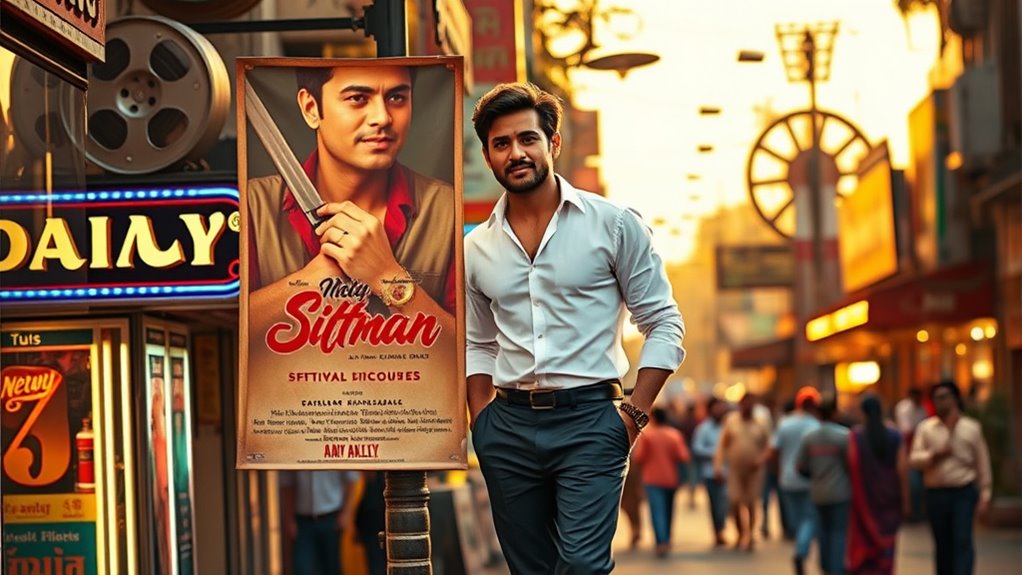
Iconic lines often capture the essence of a character’s worldview, inspiring audiences across generations. The phrase “Babumoshai, Zindagi Badi Honi Chahiye, Lambi Nahi” from Anand perfectly exemplifies this. Spoken by Rajesh Khanna’s character, Anand, it emphasizes that life should be meaningful, not just long. You’re encouraged to focus on quality over quantity, living with purpose and joy, even when faced with adversity. This dialogue resonates because it challenges the fear of death, urging you to make the most of every moment. Its timeless appeal lies in its simple yet profound message, inspiring countless people to cherish life’s experiences rather than worry about its duration. Over decades, this quote has become a cultural icon, reminding everyone to live fully. Furthermore, reflections on life and death highlight the importance of living a meaningful existence rather than fearing the inevitable end.
“Dosti Ka Ek Usool Hai Madam – No Sorry, No Thank You” From Maine Pyaar Kiya
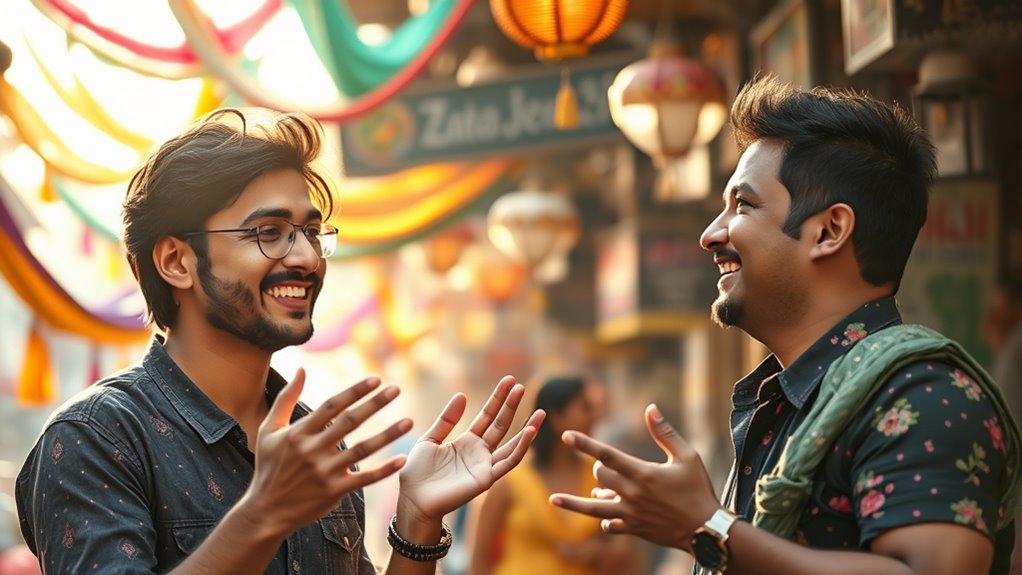
The line “Dosti ka ek usool hai madam… no sorry, no thank you” from Maine Pyaar Kiya has become a defining symbol of true friendship in Bollywood. It captures the essence of genuine bonds—where apologies and gratitude aren’t necessary between friends. It symbolizes unconditional friendship, which transcends material gestures and formalities. This sentiment reflects the core values of loyalty that are often celebrated in Indian culture. This simple yet powerful dialogue, delivered confidently by Salman Khan, resonates across generations and has become a cultural staple. Its popularity extends beyond the film, frequently appearing in memes, social media reels, and friendship celebrations. This line highlights the values of loyalty and unconditional support that define real friendship. Its lasting impact cements its place as one of Bollywood’s most iconic quotes, reminding us that true friendship often operates on unspoken trust and understanding. Additionally, the cultural significance of this quote underscores how iconic lines can influence societal perceptions of friendship and loyalty. The enduring popularity of such dialogues demonstrates how film quotes can shape social interactions and cultural bonding, reinforcing shared values. This phenomenon is complemented by the rise of smart home integration and energy-efficient appliances, which also aim to foster harmony and efficiency in our daily lives.
Gabbar Singh’s Menacing Line “Kitne Aadmi The?”
Have you ever wondered what makes Gabbar Singh’s line “Kitne Aadmi The?” so unforgettable in Bollywood history? It’s because this simple question captures his menacing presence and authority. In the iconic film Sholay, Gabbar questions his men after a failed mission, seeking the number of survivors. When told “Sardar, do aadmi the,” his response is a chilling mix of mockery and threat, delivered with sharp pauses and a commanding tone. Played by Amjad Khan, Gabbar’s interrogation style became a benchmark for villainy, embedding this line into popular culture. Its raw regional ruggedness and menacing delivery made it a symbol of fear and dominance, ensuring its place in Bollywood’s legacy of unforgettable dialogues. The dialogue’s impact is amplified by the context in which it was delivered, making it a quintessential example of how a single phrase can define a character’s intimidating persona. Additionally, the character’s authoritative demeanor contributed significantly to the line’s enduring popularity, cementing Gabbar Singh as one of Bollywood’s most iconic villains. Furthermore, the cultural resonance of the line has persisted for decades, as it continues to be referenced and parodied in various media, highlighting its timeless influence. Its memorability is also partly due to the cinematic brilliance with which Amjad Khan portrayed Gabbar’s menacing aura, making the line an indelible part of Bollywood history. The performance of Amjad Khan set a standard for villainous roles, inspiring countless actors in Indian cinema.
Mogambo’S Signature “Mogambo Khush Hua!”
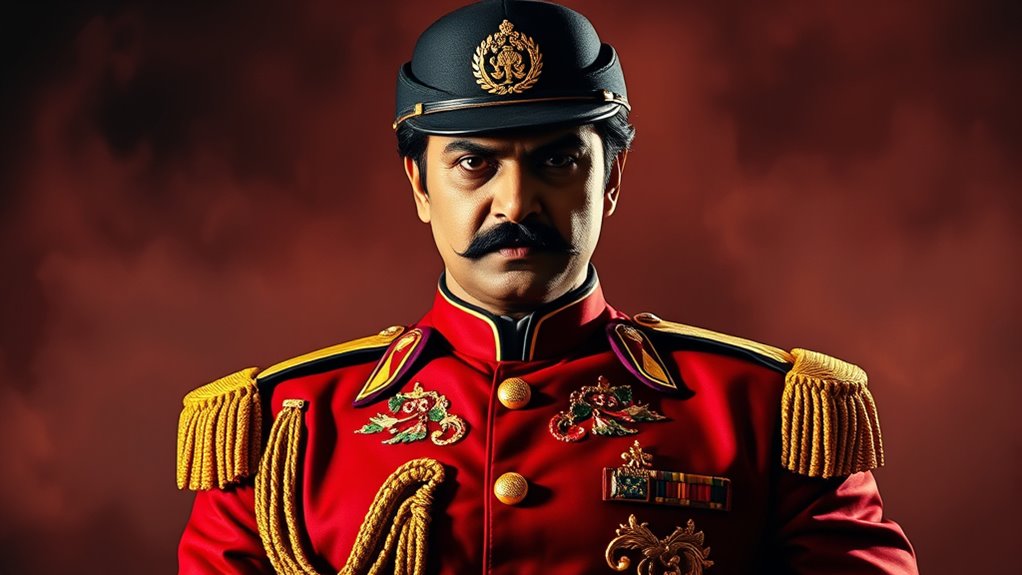
Following Gabbar Singh’s chilling menace, Bollywood introduced a villain whose words exuded sinister satisfaction—Mogambo’s famous “Mogambo Khush Hua!” This line, delivered with theatrical flair, quickly became a symbol of villainous triumph, capturing viewers’ imaginations. Amrish Puri’s powerful performance transformed the line into an iconic catchphrase. Its cultural impact extends beyond the screen, often used in memes and everyday conversations to show triumph or satisfaction. The phrase’s popularity stems from its dramatic delivery and the character’s menacing presence, making it timeless. Decoding slang and colloquialisms helps us appreciate how such memorable lines leave a lasting impression on audiences. The line’s enduring appeal is also reflected in its frequent reference in popular culture and social media, where it continues to evoke a sense of victory. Additionally, the character’s villainous persona helped cement the phrase as a memorable quote in Bollywood history. Recognizing the growth of iconic dialogues in cinema illustrates how storytelling techniques contribute to cultural legacy.
Anand’S Philosophical Quote on Life
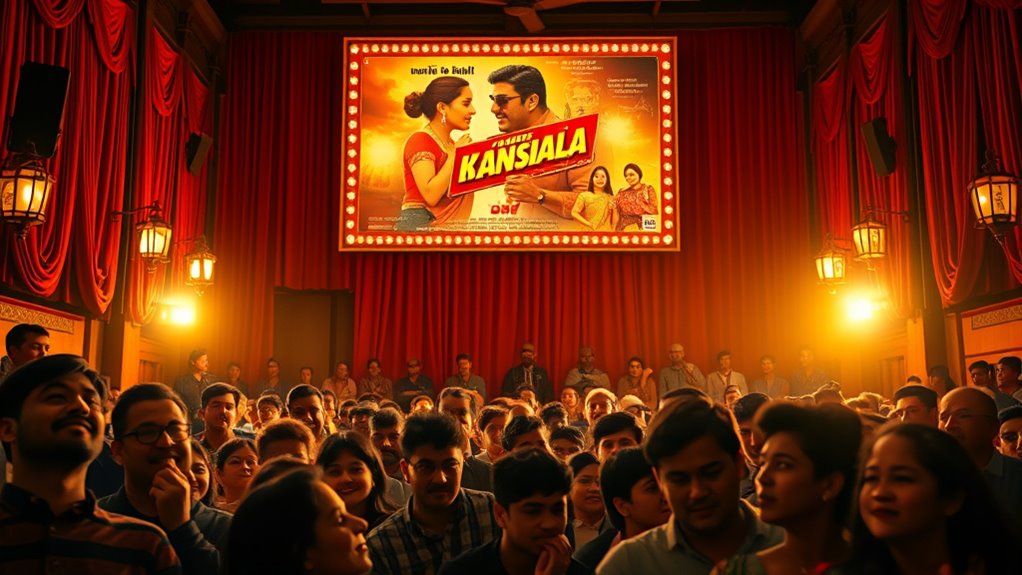
Anand’s quote reminds you that life’s true value lies in its meaning, not its length. It encourages you to appreciate simplicity and find wisdom in everyday moments. These timeless ideas continue to inspire generations to live thoughtfully and cherish what truly matters.
Life’s True Value
The film “Anand” offers a profound perspective on life’s true value, urging you to focus on the quality of your experiences rather than their duration. It emphasizes that a meaningful life isn’t measured by years but by joy, friendship, and contribution. Anand’s outlook teaches you to cherish every moment, accept death as natural, and seek happiness over longevity.
Here are three key lessons:
- Prioritize joy and happiness—live fully, not just long.
- Value friendship everywhere—true connections can be found anywhere.
- Contribute positively—leave a meaningful impact on society.
This philosophy reminds you that life’s richness lies in the moments you create and share, not in how long you live.
Wisdom in Simplicity
Sometimes, the simplest words carry the deepest truths about life. Anand’s philosophy reminds you not to borrow sadness from the future, urging you to live fully in the present. He suggests keeping personal sorrow private to protect collective happiness—”Dukh apne liye rakh, Anand sab ke liye.” His words reflect that life’s strength surpasses death, yet he questions if life is truly better, prompting deep reflection. Fear of death, he says, is a misunderstanding—”Maut ke daar se agar zinda rehna chod diya.” His wisdom emphasizes that life should be meaningful, not just long. Simple language masks profound insights, making these lessons accessible and timeless. Anand’s dialogues inspire you to find joy in everyday moments and embrace life’s fleeting nature with optimism.
Inspiration Across Generations
A powerful quote from Anand about life and death continues to inspire across generations by encouraging us to see beyond fear and embrace the deeper meaning of our existence. His words remind us that life is stronger than death but questions whether living is better than dying. Anand teaches that death is just a brief moment, not something to fear if you truly live. His philosophy emphasizes that life should be meaningful (badi), not just long (lambi), and that higher powers control our fate.
Here are three key lessons:
- Live fully without fear of death.
- Focus on making life meaningful through good deeds.
- Embrace joy and sorrow as parts of life’s balance.
The Iconic Permission Scene “Ja Simran Ja Jee Le Apni Zindagi”
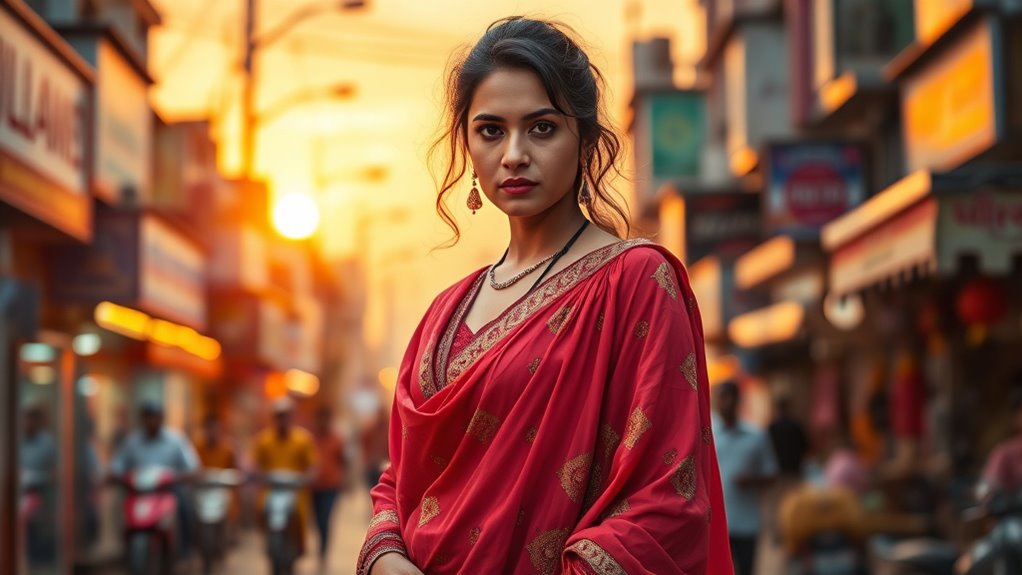
You probably recognize the iconic scene from “Dilwale Dulhania Le Jayenge” where Raj encourages Simran to assert her independence by saying, “Ja Simran Ja, Jee Le Apni Zindagi.” This moment marks a turning point, as her father finally grants her permission to pursue her own destiny, symbolizing a shift from traditional control to personal choice. The line has become a cultural touchstone, often recreated in weddings and social media. It represents a rare instance of liberation within Indian family structures, highlighting the emotional weight of letting go. While rooted in gender roles, it’s celebrated as an empowering moment for women, capturing the essence of breaking free from societal expectations. This scene remains one of Bollywood’s most quoted and influential moments.
The Uplifting Phrase “All Izz Well” From 3 Idiots
You’ve probably heard “All Izz Well” used beyond the movie, as it’s become a symbol of hope and resilience in media and daily life. Its catchy, uplifting message resonates across generations, fueling memes, motivational talks, and cultural references. This phrase’s widespread popularity cements its place as an iconic Bollywood catchphrase that continues to inspire millions.
Cultural Impact
The phrase “All Izz Well” from the film “3 Idiots” has become a powerful symbol of resilience and hope in Indian culture. It reflects a mindset of positivity during tough times, inspiring countless individuals to stay strong. Its impact extends beyond entertainment, shaping social attitudes and conversations.
Here are three ways it influences culture:
- Cultural Identity: It embodies Indian resilience, humor, and adaptability, making it instantly recognizable.
- Social Connection: The phrase fosters community, shared humor, and emotional support across social media and daily life.
- Educational Reflection: It addresses academic pressures, encouraging students to maintain optimism and pursue passions despite societal expectations.
This phrase’s universal message resonates globally, symbolizing hope in adversity and the strength of positive thinking.
Popularity in Media
The iconic phrase “All Izz Well” from *3 Idiots* has cemented its place not just in everyday conversations but also prominently in media. Since the film’s release in 2009, this phrase has been frequently referenced in comedy skits, news articles, and social media trends, especially during stressful times. Its positive message of confidence and resilience resonates widely, making it a go-to quote during crises. Media outlets often cite “All Izz Well” in motivational segments, reinforcing its cultural significance. The phrase’s popularity extends beyond entertainment, influencing memes and online campaigns, solidifying its status as a symbol of hope and perseverance. Its widespread media presence ensures that this simple phrase remains a powerful, uplifting reminder for audiences of all ages.
Frequently Asked Questions
Why Is “Mere Paas Maa Hai” Considered the Most Emotional Dialogue?
You see, “Mere Paas Maa Hai” is considered the most emotional dialogue because it captures the deep bond between a mother and child, highlighting sacrifice, love, and loyalty. When you hear it, you feel the pure, universal emotion of family. Amitabh Bachchan’s heartfelt delivery makes it resonate even more, reminding you of the strength of maternal love. Its simplicity and emotional depth make it timeless and universally relatable.
How Did “Kitne Aadmi The?” Influence Villain Portrayals in Indian Cinema?
Ever wondered how one line changed villain portrayals? “Kitne Aadmi The?” from *Sholay* transformed Indian cinema by showcasing villains as complex and memorable characters. It shifted the focus from mere evil to layered, impactful roles, inspiring filmmakers to craft villains with depth. This iconic dialogue made villains more intimidating and charismatic, setting a standard that still influences modern cinema. It’s a proof to how a single line can redefine character portrayals.
What Makes “Mogambo Khush Hua!” so Instantly Recognizable?
You find “Mogambo Khush Hua!” instantly recognizable because it combines a powerful delivery with a memorable character. The phrase’s familiarity is boosted by Amrish Puri’s iconic performance, making the line stand out. Its simplicity, combined with cultural significance and widespread use in memes and daily conversations, keeps it alive in popular culture. This blend of strong acting and cultural impact makes it a timeless, instantly identifiable catchphrase.
Why Is “Babumoshai, Zindagi Badi Honi Chahiye” Still Inspiring Today?
You find inspiration in “Babumoshai, zindagi badi honi chahiye” because it reminds you that life’s quality matters more than its length. This message encourages you to live purposefully, making your days meaningful rather than just counting years. Its timeless wisdom still motivates you to focus on impact and fulfillment, reminding you that a life well-lived is about significance, not just longevity.
How Has “All Izz Well” Become a Symbol of Positivity?
Imagine facing a storm, and hearing someone say, “All Izz Well” to calm your nerves. That’s how this phrase became a symbol of positivity—it’s like a mental umbrella shielding you from stress. When you repeat it during tough times, it reassures you that things will get better. Its widespread use in culture shows how powerful simple words can be in fostering hope, resilience, and mental strength.
Conclusion
These dialogues are the threads that weave the vibrant tapestry of Bollywood’s soul. They remind you of moments when emotions ran deep, and words became timeless melodies echoing in your heart. Just like cherished memories, these lines continue to light up your mind, guiding you through life’s ups and downs. They’re the stars in your cinematic sky, forever shining, forever inspiring, illuminating your journey with the magic of Bollywood’s eternal charm.
